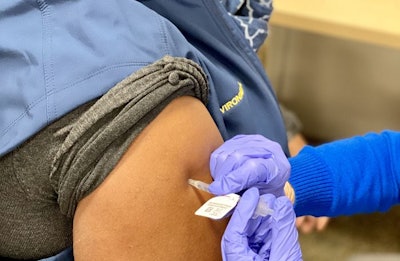
Workers at meat and poultry plants are increasingly becoming prioritized to become vaccinated for COVID-19, but there are still cases of those workers being reluctant to receive the vaccines.
KatieRose McCullough, director of regulatory and scientific affairs for the North American Meat Institute (NAMI) indicated that she was pleased that there is more vaccine capacity and that more people in the meat and poultry industry are given early priority by their state health agencies to become vaccinated.
“We’re finding there’s a lot of buy-in from states to be prioritizing meat and poultry workers, as they should be,” McCullough said during the Annual Meat Conference on March 24. “Right now is really a great time where a lot of people and a lot of people and a lot of plants are being able to have vaccination clinics.”
Despite that, not everybody who is eligible to receive a vaccine wants to take advantage of the opportunity.
“Vaccine hesitancy has been a big focus for the industry,” she said.
The U.S. Centers for Disease Control and Prevention (CDC) has been very cooperative with the meat industry by providing information through different means and in different languages that can help people better understand what the vaccine does and what the potential side effects may be, McCullough said.
But one challenge is not every plant has the same demographics, and the concerns at one facility may not be the same at another. There is no one-size-fits all approach for the industry to ease apprehensions, so there is a need to find the specific concerns at each facility.
“A hyperlocal approach is really what it takes to be helpful,” she said. “Every single plant -- whether it’s a hog plant or poultry plant or beef plant -- covers all different cultures, and the people that live and work there are all very different.”
The plants where the employees were asked about their particular concerns have been more successful in the effort to encourage vaccinations, as have been the facilities that partnered with local community leaders to learn the cause of the hesitancy and how they can better communicate.
View our continuing coverage of the coronavirus/COVID-19 pandemic.


















